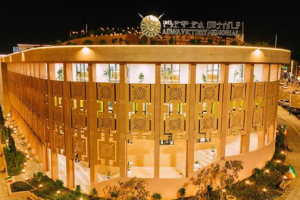BY MULUGETA GUDETA
The global corona virus pandemic and the quarantine that followed have led or forced people around the world to resort to reading as the main pastime or as an opportunity for diversion or learning depending on how you look at the matter.
In Ethiopia the quarantine is not sweeping and there is no strict lockdown. Nevertheless, many people chose to stay home particularly at the earlier phase of the pandemic and spent their days exercising, reading or doing other jobs. Many of them also started reading books or writing new works that they had no time to perform in the past.
Elsewhere in the world, the quarantines helped millions of people read the books they kept on their shelves for a long time and writers write the books they had so far postponed to produced. This trend may also be the reason for the rising number of readers and the books that are being published these days.
Ethiopia is a huge country with more than 110 million people. With a low literacy rate and a weak publishing industry. It cannot be described as “a country of bookworms” even by African standards. However, recent events seem favorable for the growth of the reading public as well as the industry. The fact that people keep on buying books and readings them however high the publishing cost and the copy price of books are.
This is an encouraging trend that further opening of the economy will inevitably reinforce in the near future. With tens of millions of students attending schools and colleges, Ethiopia is certainly set for a genuine cultural revolution with book reading as its main catalyst.
Two main features characterize the area around the National Theatre, which is the first modern theatre house in Ethiopia, after Hger Fikir Theatre which is considered a pionee. One is the emerging business district with the main private banks building their head quarters there. The second feature is the proliferation of bookshops and ambulatory book vendors who roam the streets rain or shine.
The third most visible feature is the money changers that are pestering you every time you appear in the area. Thankfully these are not my main focus in this article, which deals with the culture of book publishing and reading.
What I recently observed in that area is the proliferation of bookshops, although they are not as visible as the tall buildings housing the new financial district. These are small shops where books are sold every day to the Addis Ababa literati and young school goers desperate for educational supplements now that schools are opening their doors after a seven-month hiatus caused by the corona virus pandemic. The pandemic is not over but learning is resuming.
It is now more than thirty or forty years since booksellers appeared and displayed their wares right on the pavements, near bus stations around the national theatre. Some of the booksellers of that era were newcomers to the book business, most of them young and jobless and they tried to earn their living by selling old and used books as well as new publications that were often sold at discount.
A classic example of that period are some of the shops that sprung up in the area and have now become the most successful outlets in town. Some of the book stalls are owned by hardworking youngsters who started their business by selling old books at discount while some of them opened small bookshops behind the National Theater building or become big players in the book distribution business.
In a recent interview with an FM radio station, one of the successful dealers outlined the long and tortuous path he followed, the hardship he faced before he became a book distributor and even publisher.
“When I started the business by displaying old books on the pavement,” said the young man, “business was so poor that there were many days when I did not even sell a single book. I stood there on the pavement the whole day and went back home on foot because I had no money to cover my transport expense.”
Another successful shop owner had to travel a long distance on foot to the area where he displayed his books on the pavement, whether rain or shine, often hounded by policemen who chased street vendor from that area. According to his own account, his breakthrough came when one day his mother borrowed some twenty thousand birr from a neighbor back at his village and gave it to him so that he could purchase old books in bulk and pay his debt after selling them.
“I was scared when I took the money from my mother,” the book vendor said in the radio interview. “I didn’t know how I was going to pay back the debt. I had no idea what the books were about. I just bought them and displayed them on the same pavement. What happened afterwards was almost a miracle.
The old books sold like hot cakes and I returned home in the evening with enough money to pay the debt the same day!” He made enough profit in order to stay in the book business with his own startup capital. He rented a shop right across the street and business started to boom and fortune smiled at him.
However, the road he traversed before achieving success was not an easy one as I said above. There were moments of despair and periods of agony over books that failed to sale. He also faced many the challenges when tried to open the small shop and as he was struggling to establish himself as a successful book vendor. He had to overcome additional hurdles before he became the famous and successful bookseller and distributor he is now.
His journey from street vendor to a successful book distributor also served as an inspiration to dozens of book vendors who emerged in the same area. Some of the young vendors survived the stiff competition while others failed to make it and faced closure.
Asked what his main weapon in his struggle for business success was, he answered by saying that strong discipline was the main quality that led to his business success. “I learned to spend my money judiciously and saved it to expand my business rather than spend it on unnecessary items.’ He said.
Nowadays, the area around the old railways station and street leading to Mexico square is lined up with bookshops. New buildings are popping up now and then in many parts of Addis. Almost all of them have bookshops on their first or second floors.
The proliferation of bookshops is a sign that the size of the reading public is growing because there is no demand for books without a parallel growth in the number of readers.
Young writers are coming up with new titles in fiction and non-fiction, poetry and historical or political books that are eagerly devoured by the new generation of readers. Writers on the other hand say that they are frustrated by the sharp rise in the cost of publishing.
In London, here is a place called Fleet Street where almost all the newspapers in the British capital are published. Some successful book sellers here in Addis have already turned into publishers. Who knows, these bookshops might create new publishing houses and others might follow suit.
In this way, that particular area might end up becoming a hub for bookselling and publishing businesses. Competition will certainly push publishing costs down and alleviate the financial constraints writers are facing now.
Moreover, competition in the publishing industry might also push book prices down and more readers will have the chance to enjoy reading and culture will flourish in the Ethiopian capital.
Maybe one day we will have the equivalent of London’s Fleet Street as “Publishers Street” here in Addis. The coexistence of an expanding financial district with a growing book selling or publishing business might look odd and unusual elsewhere in Africa. Maybe Addis is taking a new initiative by embedding money with culture and this is certainly a welcome change.
The future of finance and culture seems to be intertwined in the newly emerging downtown area of Addis thanks to hardworking fanciers as well as booksellers and publishers.
This kind of symbiosis between money and culture can even serve to promote tourism in the Ethiopian capital. Many booksellers also display antic books that have long gone out of print and these rare items are sought after by tourists who are interested in ancient Ethiopian culture.
That was why in the old days, bookshops in Piazza and Mercato were visited by tourists who were out to purchase rare books of great intellectual interest for historians and libraries around Europe or America. These bookshops were in a way serving as promoters of local culture.
The Addis Ababa city administration would do a great job by encouraging dealers in old books on Ethiopian culture and history by providing them with the right location as it has provided fruits and vegetables vendors with a new location where they had been doing business for the last year or so.
Of course there is some risk in displaying rare books for sale as there are many foreigners who pose as tourists and hunt for such treasures they buy at cheap prices in order to make fortunes in Europe or America.
The alternative would be for the city administration or the national archives to buy these books and keep them from being objects of profiteering by smugglers of culture disguised as tourists.
Anyway, the emerging financial district of Addis seems to grow side by side with the book vending and publishing industry in the same area. Both are going to go through a period of boom as long as Addis Ababa keeps on growing both economically and culturally. And this is a major reason that makes Addis one of the world’s great capitals worth visiting any time of the year.
The Ethiopian Herald December 25/2020





